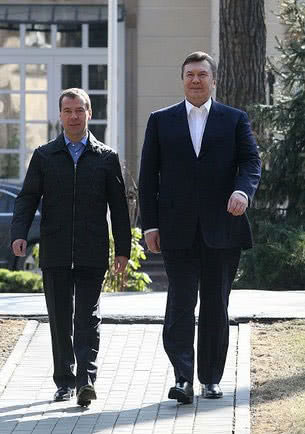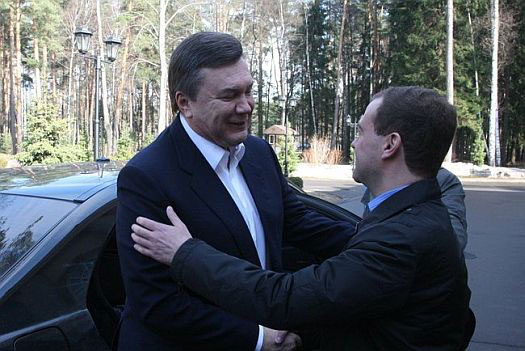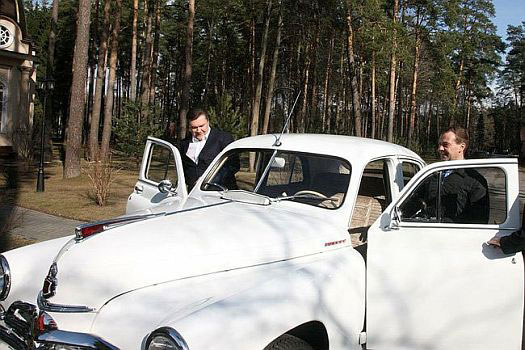1tv.com.ua is becoming an affiliate of www.1tv.ru.
If you’re a post-Soviet-born Ukrainian who lives in Ukraine, you better learn Russian. Why? Because the Russians, Russified Ukrainians and some other people who have lived in Ukraine for generations don’t want to learn Ukrainian. Fair enough?
Take the National Television Company of Ukraine (NTCU). Neither its president, Yevhen Benkendorf, nor its vice president, Walid Harfouch, speaks Ukrainian.
Education Minister Dmytro Tabachnyk does speak Ukrainian, and God knows how much he hates it. In a bid to preserve the legacy of Russification, he wants to stop mandatory dubbing of foreign language movies into Ukrainian.
He has already revoked mandatory Ukrainian language exams for students completing their bachelor degrees. He says it’s the European way.
Well, the French would disagree, and so would some Germans.
Back to Ukraine, the list of reforms goes on:
No more Institute of National Security Problems
No more National Institute of International Security
No more interministerial NATO membership preparations сcommission
No more Euro-Atlantic integration center
No more rallies without arrests
Congratulations Rick Davis, Paul Manafort, Phil Griffin and the Appeasement Institute in Ukraine! You’ve just won your magic Pobeda ride!


Buckle up, Uncle Sam!
Wednesday, April 07, 2010
No More Russian-to-Ukrainian Dubbing on National TV
Subscribe to:
Post Comments (Atom)





16 comments:
Well, that's sound nasty. I wouldn't speak on an other language in my homeland, because the government is lame.
Heh, Medvedev looks so tiny compared to your President. :P
Dude! What's with the mandatory dubbing? Who does that in the world? Seriously.
Jesus, Taras, that's really gross. Especially in view of Ukraine's past, I suspect many Ukrainians will read the writing on the wall -- the past is coming back!...
Is Yuliachka going to do something about that? Can the opposition parties summon up sufficient support, at least in Western Ukraine, to try to counteract these measures? It looks like Yanukovych is trying to become another run-of-the-mill dictator, like Kuchma. Or worse, like Lukashenka...
Ropi,
The bigger they come, the harder they fall:)
Strex
Different countries have different laws. Mandatory or not, when it comes to foreign-language movies, movie theaters around the world will show you either subtitled or dubbed versions.
If somebody speaks Spanish in a news report on BBC, CNN or FOXNews, they do provide a translation, don’t they?
Besides, in Ukraine it’s a far more complex issue. Unlike English or Spanish, our language has been oppressed for the last few centuries.
Lingüista,
“Everything’s back to square one,” as Kuchma put it.
Tymoshenko has almost gone off the radar screen. She hasn’t appeared on talk show in weeks. I miss her lies already.
She calls for a parliamentary probe into the dealings of the Constitutional Court — in the face of 10 more defectors expected to join the coalition.
Taras,
I'm well aware of the issue, but mandatory dubbing and mandatory subtitling are two completely different things! Here is an example:
In Hungarian cinemas very often there is a dubbed and a subtitled version of the same movie, and you can decide which one you'd like to watch. It comes down to the choice of the individual, not the state.
But there are other "European' solutions, like in Sweden, Norway or Finland, where they seldom dub movies or TV shows, instead there are Swedish/Norwegian/Finish subtitles provided.
I'm also well aware of the complexity of the issue in Ukraine. To me, mandatory dubbing looks like a late and desperate attempt of undoing or counteracting the horrible things Russians did to the Ukrainian people in the 19th century and later. But it's just not the way to do it, sorry.
In Russia, they dub movies into Russian.
I don't see anything late or desperate about it.
News channels around the world provide voiceover translations of foreign-language dialogues. Again, I don't see anything late or desperate about it.
No offense, but I would not bring up Russia as an example to follow, especially not in language issues. As a Ukrainian you should know that your ancestors had experienced their methods and God, they were anything but pleasant.
I've seen a couple of Russian-dubbed movies and I could not decide whether I should cry or break out in laughter. Dubbing is an art if you want to make it good. The quality of Russian and - no offense again - Ukrainian dubbing is simply ridiculous. I have to stress, this is about movies and TV shows, not news. That is also a completely different issue.
I am sorry, there is no room in a blog comment to explain why is it late and desperate to follow techniques which were largely used in the 19th century all over Europe, but nowadays are considered intolerant and also very dangerous practices. There is also no room to explain why France is not a good example, as the core of their idea of citizenship and nation is completely different from the culture and ethnicity based nationalisms in Central-Eastern Europe. If you have time and you are interested you'll find excellent reading material from Rogers Brubaker on this issue: http://www.sscnet.ucla.edu/soc/faculty/brubaker/
Strex,
My argument boils down to Ukrainian v. Russian, not dubbing v. subtitling. I believe that Ukrainian should be the language, as required by law
Of course, dubbing raises quality and feasibility issues. I’ve heard giant mistranslations too, both in Ukrainian and Russian versions. I wouldn’t call dubbing desperate in and of itself, though. It’s a traditional practice inherited/imported from the USSR/Russia.
I’m not in a position to teach France or Germany or Israel or Russia or any other country how to make language or citizenship laws. It’s their business, not mine.
I can only talk about how they treat us compared to how we treat them.
Taras,
OK, let me get this straight:
I agree with you that in Ukraine, Ukrainian shoud be state's language. No doubt or question about that.
What I'm questioning is the details, how it is implemented, on what levels of society, education or media it is required to be the only language that can be used. As always the Devil is in the details. I'm ready to discuss this as well later on.
When it comes to national television it is only natural, that everyone who speaks the state language should understand what's going on. Of course there are exceptions with multi-language countries such as Switzerland, Belgium or Canada, but that's a completely different story and it would not do any good to get into it.
When it comes to Ukraine, I beleive mandatory subtitling would be the best solution. First of all, because of financial reasons, but also because of the country's unique situaton.
Of course dubbing itself is not desperate. It is just a tool, and yes, an old (and obsolate) practice inherited from the old times. Mandatory dubbing is a tool for a purpose of forcing certain groups of the population to do something against their will and individual preferences. But stop here for a moment. What will this part of the Ukrainian population do if they do not understand the dubbed version? Will they start learning Ukrainian like crazy all of a sudden? Or will they just chose the easy way and switch to the Russian channel immediately?
Think about it. Watching Russian movies, listening to Russian music and the Russian media. I'm not saying they are not doing it anyway, but by forcing Ukrainian in forms which would not be necessary you deny even the slightest chance from them to understand the message. This is definitely counterproductive if you think it through.
Of course Ukrainians should decide what the message should be. Would you like all nationalities living in Ukraine to be loyal to Ukraine or you want them dissolved and forget their roots and become pure Ukrainians? If you can achieve the first, you get a stable country. Eventually you might even get the second as a bonus in the long run.
You can go for the second but the outcome is quite ambiguous and can easily result in a bloody conflict, although the short term effects might seem to appease the national pride of the majority.
What you cannot expect is getting loyalty in exchange for forced assimilation.
Finally I think you misunderstood me about the French idea of nationalism. What I was trying to say is that one must be careful when picking examples for comparison. BTW, I'd be more than interested in how the French, the German and the Israelis treat Ukrainians.
As a Ukrainian, I support the “one country, one language” formula, with a civilized degree of regional multiculturalism.
In totalitarian countries, forced assimilation and genocide can actually result in a high degree of loyalty. If you need a case of Stockholm syndrome on a mass scale, consider the case of Russified Ukrainians.
In post-totalitarian Ukraine — where ethnic Ukrainians make up 80% of the population — de-Russification should allow for liberty in exchange for loyalty.
When Ukraine greets tourists with open arms, the tourists’ countries often fail to return the courtesy. Since 2005, we have maintained a one-way visa-free regime with Europe and North America. Thanks to this policy, we’ve gained an extra few billion dollars in tourist revenue but not respect and reciprocity.
As long as Ukraine remains a banana republic, Ukrainians will be treated as untermenschen. You keep them in waiting lines for hours, you charge them hundreds of dollars for interviews, and then you show them the door. Standard procedure.
2007: Invited to a French festival, children’s ensemble danced in front of the French Embassy until the French reversed their last-minute visa denial.
2008: Eager to please Moscow, the French and Germans ditched Ukraine’s request for a NATO Membership Action Plan.
2009-2010: The Israelis, Poles and Russians tell us not to praise Bandera even though we never tell them not to praise Stern, Pilsudski and Denikin.
Bottom line, when it comes to treating Ukraine, many countries forget the Golden Rule.
Taras,
We agree on the first statement, that is definitely a good sign.
And yes, forced assimilation might work pretty good under totalitarian regimes, but - at least I hope - Ukraine is not on the track of becoming one. The two scenarios I've described are meant for democratic are at least close to democratic states. These are the realistic options for Ukraine, these are the circumstances which need to be taken into account.
I do not fully understand this:
"In post-totalitarian Ukraine — where ethnic Ukrainians make up 80% of the population — de-Russification should allow for liberty in exchange for loyalty." Can you explain before I comment?
About the attitude of European countries.
I am fully aware of this dishonest and hypocritic attitude of some EU countries. I am also a Ukrainian citizen by the way, but I've been living in Hungary since 1995. I could tell endless personal stories of how my Ukrainian passport meant humiliation and double standard whenever I was applying for a visa, crossing an EU border or - very often - dealing with Hungarian state authorites. The last case might be a little surprising if I tell you that I'm actually Hungarian by ethnicity.
There is one thing I've learnt: foreign policy is not based on reciprocity, morals, justice, or any other ideals that some of us cherish and adore. What Ukraine does to its minorities has or should have nothing to do with what EU countries, Russians, Americans or whosoever say about it, or how they are treating their own. Just like in a person's life: if you do things the way you do, because others tell you so, there will be no genuine deeds your life will be not yours. Ukraine should figure out by itself what to do, of course studying how others did it, but not as a reaction, rather as a source of information, a path a road that has been taken by others. As in everything, you have to be pragmatic rather than emotional.
About Bandera and the others. My knowledge about him is very scarce but I do know that him becoming a national hero is a sensitive question. Every nation needs heroes and no country should ever deny the right from one to have one. One nation's hero is a terrorist or mass murderer to the other. In England there is a monument to the guy who lead the bombing attacks on German civilian targets in WWII. I honestly do not know what would be a the right to do with Bandera's memory. I really don't.
Yes, Country A’s heroes don’t always translate into Country B’s heroes and vice versa.
For example, the U.S. “Marines’ Hymn” sits easily with Mexico.
Countries should know both sides of the story, based on best available sources.
I try to leave other countries’ heroes alone unless they’re Nazis, Bolsheviks or Khmer Rouge or some other repressive/genocidal regime.
You can think of the liberty-for-loyalty approach as an alternative to the love-it-or-leave-it one.
Basically, it means the liberty to preserve one’s ethnic heritage in exchange for one’s undivided loyalty toward Ukrainian culture, language and statehood.
Okay, we are getting somewhere. I understand (and agree with) the loyalty toward Ukrainian statehood. But what does loyalty toward language and culture exactly mean?
This is how I picture it:
The national-ethnic minority has various cultural and/or (wherever possible) self-determination rights INSIDE Ukraine. There are certain territories where the language of the minority can be used in official communication paralell with Ukrainian. But this can be done strictly on a local/regional and NOT on national level.
They are provided with all necessary means (education materials e.g.) of acquiring a good knowledge of Ukrainian. Minorities are well respected and included among the buiding blocks of the state itself. In exchange, they feel it to be their home, and such such, they are loyal to it. After all, this is a country which respects them, why wouldn't they do it vice versa?
Nice dream, isn't it? :)
Good news for you:
http://korrespondent.net/showbiz/cinema/1075088
Thanks! I've heard of it. I'm glad they left Ukrainian alone.
Post a Comment